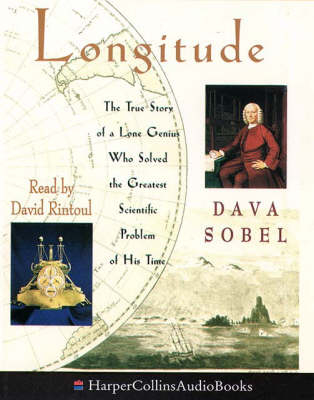
Longitude
1996
HarperCollins Publishers Ltd (Verlag)
978-0-00-105337-3 (ISBN)
HarperCollins Publishers Ltd (Verlag)
978-0-00-105337-3 (ISBN)
- Titel ist leider vergriffen;
keine Neuauflage - Artikel merken
As gripping as any novel, this is the true story of John Harrison’s lifelong quest to make navigation at sea a science not a dangerous guessing-game.
Anyone alive in the 18th century would have known that "the longitude problem" was the thorniest scientific dilemma of the day - and had been for centuries. Lacking the ability to measure their longitude, sailors throughout the great ages of exploration had been literally lost at sea as soon as they lost sight of land. The quest for a solution had occupied scientists, and their patrons for the better part of two centuries when, in 1714, England's Parliament upped the ante by offering a king's ransom to anyone whose method or device proved successful. The scientific establishment throughout Europe had mapped the heavens in both hemispheres in its certain pursuit of a celestial answer. In stark contrast, one man, John Harrison, dared to imagine a mechanical solution - a clock that would keep precise time at sea, something no clock had been able to do on land. This work tells the story of this epic scientific quest, and of Harrison's 40-year obsession with building his perfect timekeeper, known today as the chronometer. It also provides a brief history of astronomy, navigation and clockmaking.
Anyone alive in the 18th century would have known that "the longitude problem" was the thorniest scientific dilemma of the day - and had been for centuries. Lacking the ability to measure their longitude, sailors throughout the great ages of exploration had been literally lost at sea as soon as they lost sight of land. The quest for a solution had occupied scientists, and their patrons for the better part of two centuries when, in 1714, England's Parliament upped the ante by offering a king's ransom to anyone whose method or device proved successful. The scientific establishment throughout Europe had mapped the heavens in both hemispheres in its certain pursuit of a celestial answer. In stark contrast, one man, John Harrison, dared to imagine a mechanical solution - a clock that would keep precise time at sea, something no clock had been able to do on land. This work tells the story of this epic scientific quest, and of Harrison's 40-year obsession with building his perfect timekeeper, known today as the chronometer. It also provides a brief history of astronomy, navigation and clockmaking.
Dava Sobel is the internationally renowned author of `Longitude’ and `Galileo’s Daughter’. She is also an award-winning former science reporter for the `New York Times’ and writes frequently about science for several magazines, including the `New Yorker’, `Audubon’, `Discover’, `Life’ and `Omni’. She is currently writing a book called `The Planets’ for Fourth Estate. She lives in East Hampton, New York.
| Erscheint lt. Verlag | 2.12.1996 |
|---|---|
| Reihe/Serie | HarperCollins AudioBooks |
| Verlagsort | London |
| Sprache | englisch |
| Maße | 106 x 139 mm |
| Gewicht | 118 g |
| Themenwelt | Literatur ► Biografien / Erfahrungsberichte |
| Literatur ► Zweisprachige Ausgaben ► Deutsch / Englisch | |
| Sachbuch/Ratgeber ► Geschichte / Politik | |
| Naturwissenschaften | |
| Technik ► Fahrzeugbau / Schiffbau | |
| Schlagworte | Harrison, John • Marinechronometer • Schiffahrt |
| ISBN-10 | 0-00-105337-X / 000105337X |
| ISBN-13 | 978-0-00-105337-3 / 9780001053373 |
| Zustand | Neuware |
| Haben Sie eine Frage zum Produkt? |